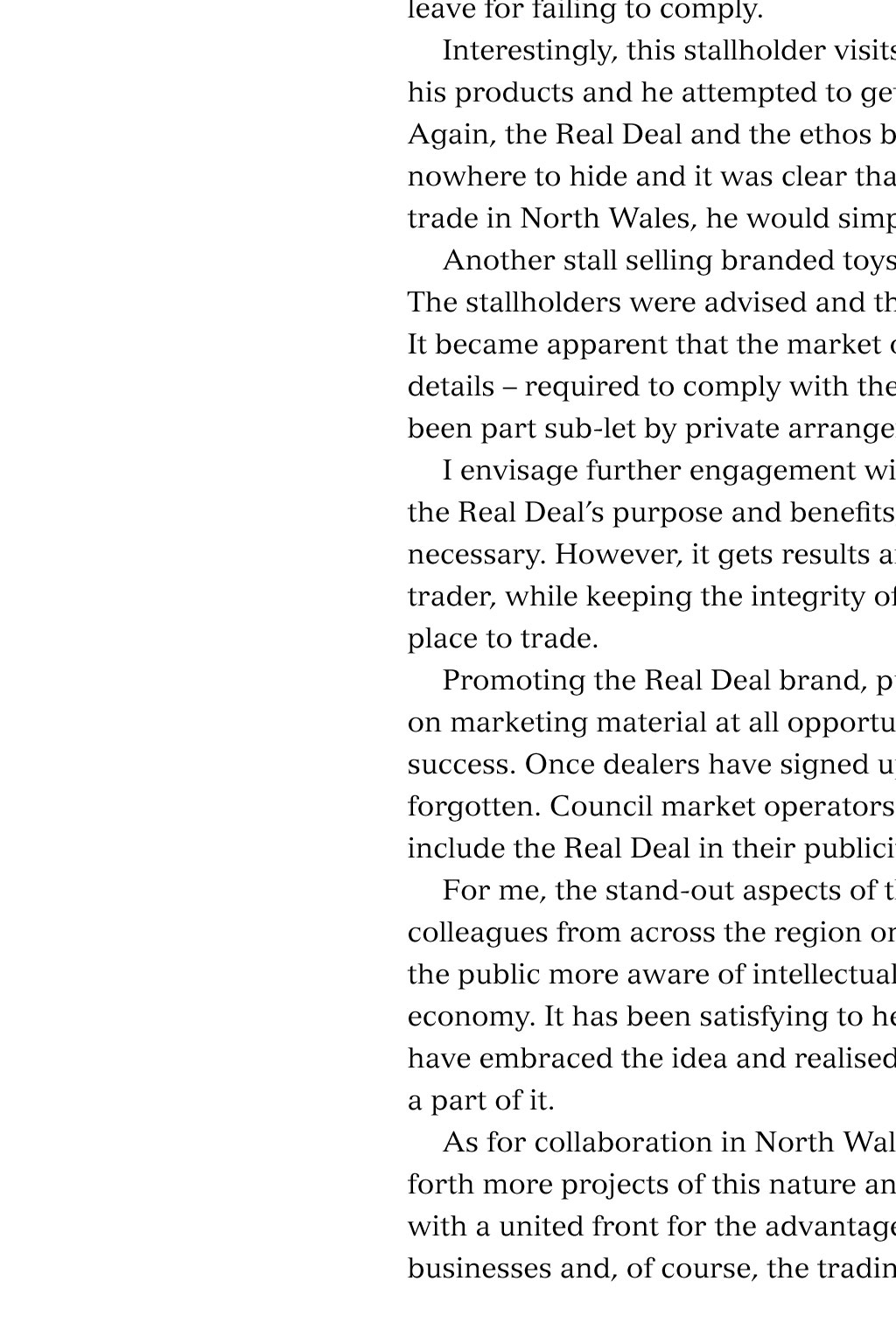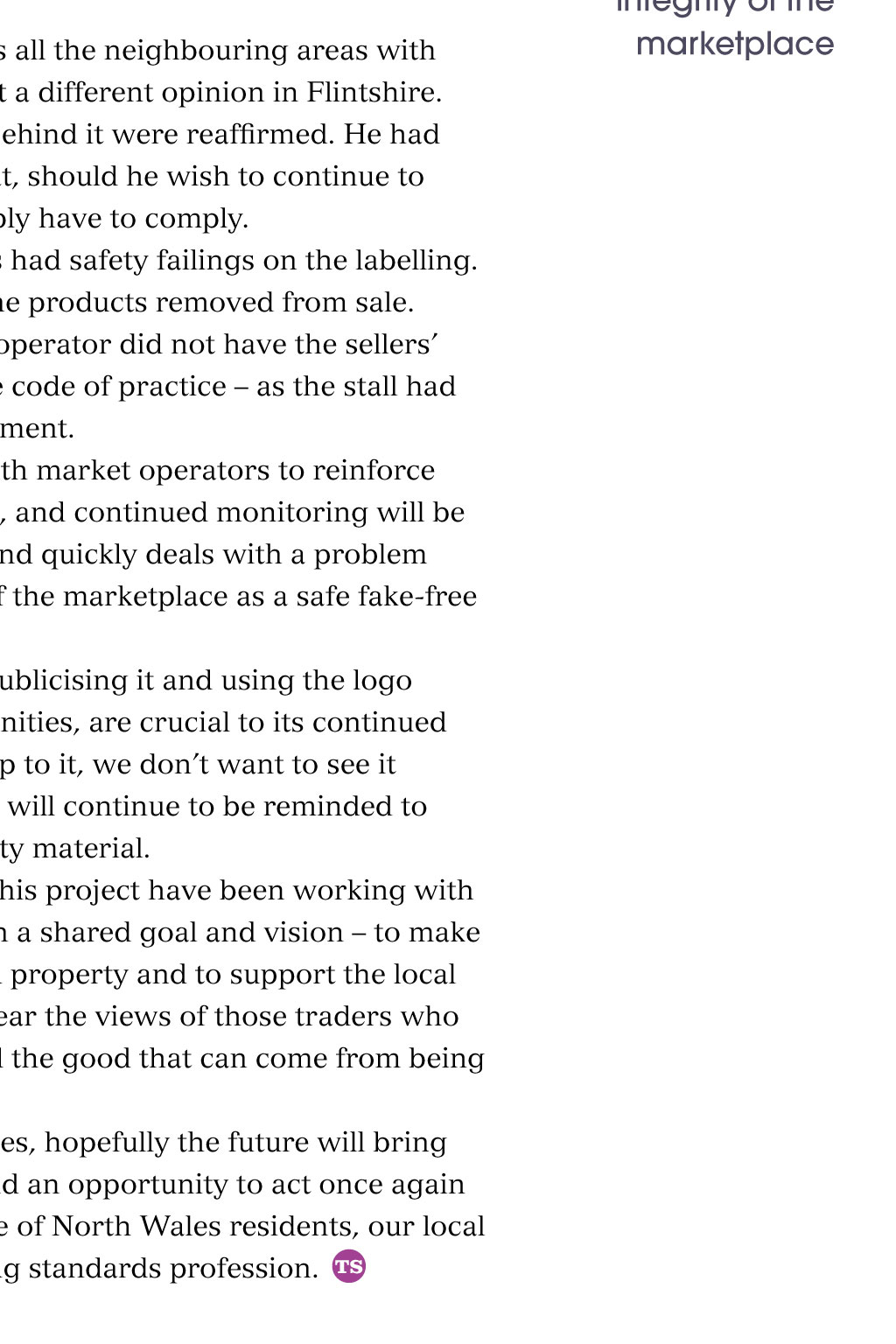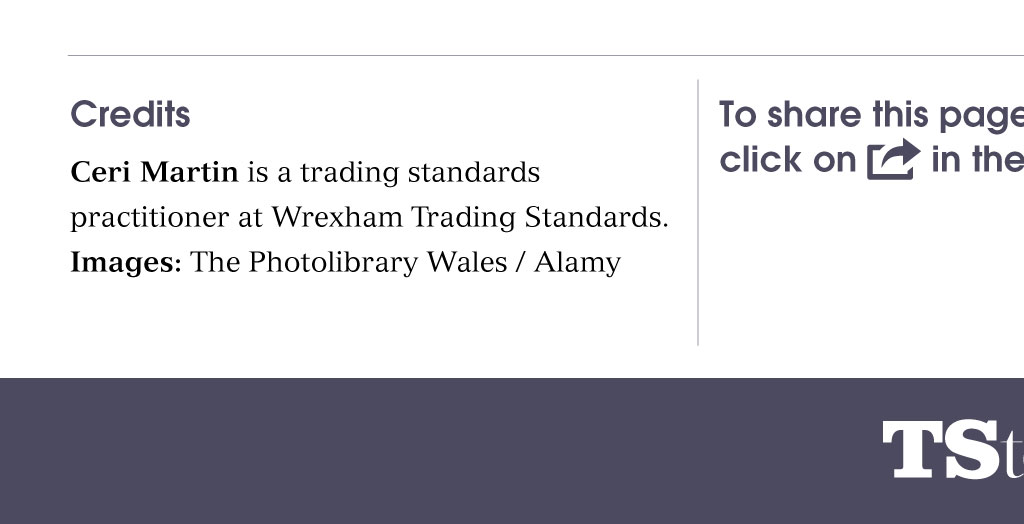




























Counterfeit goods: markets In this feature collaboration intellectual property safe markets The Real Deal An innovative region-wide initiative to combat the sale of fake goods at markets in North Wales believed to be the first of its kind is working to drive out counterfeiters. Ceri Martin candidly recounts the learning curve P roduct counterfeiting falls under intellectual property (IP) crime and is a growing global issue, accounting for an estimated five to seven per cent of global trade. Inferior and cheaply produced goods are labelled with well-known trademarks and sold to the public, ripping-off customers and undermining local confidence. North Wales has declared war on the counterfeiters. This first joint initiative of its kind started as an informal collaboration between six local authorities, culminating in October 2015 in the North Wales launch of the Real Deal a strategy to keep markets fake-free. It involves a signed agreement between the local authority trading standards service, market operators and traders, to follow a code of practice to trade fairly and work together to stamp out counterfeiters from the marketplace. It is a great example of working together within an authority area to support the local economy, and to help protect the public by giving themconfidence to shop locally. It is a simple concept with a very positive message. Preparation The idea of trying to get a region on board to leave the counterfeiters with nowhere to hide was applauded About two years ago, North Wales embarked on an informal collaboration to focus on key regional projects, such as raising intellectual property awareness. A project group was established that incorporated trading standards officers from all six local authorities some as a point of contact rather than those with an IP specialism. Atwo-year project plan was developed, with the Real Deal being the primary objective for year two. Id heard about the Real Deal, and it seemed like a great idea, with the opportunity for good publicity for allconcerned. Wrexham is a traditional market town. It has three indoor markets, the oldest of which was established in 1848, and a regular outdoor market each Monday. Traders tend to move between markets across North Wales; the neighbouring areas of Denbighshire, Flintshire,Conwy, Gwynedd and Anglesey have a similar footprint. Between us, there are 16 council-run markets and a number of privateoperations. The idea of the Real Deal is initially to engage the council markets and sign them up, and then further down the line gain compliance from the private operators. In the past, some of our market places have been rife with counterfeit and unsafe products. In Wrexham, one trader supplying counterfeit clothing and footwear was prosecuted three times by the local authority, and then was given a prison sentence only at that point was he finally kicked out of the market. Aware of these past issues, I sought out Patricia Lennon, the Real Deal campaign director, at CTSI Conference, Harrogate, in 2014. Wediscussed at length the benefits of the campaign and how to get it off theground. I mentioned the North Wales collaborative project and wanting to bring this to the table, involving all six authorities. The idea of trying to get a region on board, in a bid to leave the counterfeiters with nowhere to hide, was applauded. Patricia and her colleague, Lorraine Henshaw, offered so much support and encouragement, making the process as seamless and straightforward as possible. CTSI Conference has proven to be a valuable source of contacts and ideas to take back to ones own authority and service. I was excited and driven to put the Real Deal on the agenda for North Wales. Collaboration and challenges When Lennon was invited to a project group meeting, the concept of setting up the Real Deal across the region was raised and immediately found support. As with anything new, it was challenging to get it off theground and find a way of working alongside the usual demands ofour own authorities. Year one for the project, and the collaboration process was fraught with obstacles and changes. Deadlines had to be adjusted and there were setbacks. Colleagues across North Wales found it hard to free-up enough time to support both it and other projects, because in common with many other trading standards across the country we were increasingly under-resourced and had fewer people to do the work. By the time we reached year two, a new group had emerged for The Real Deal launch in Conwy the IP project, which this time incorporated colleagues with specific knowledge and interest in IP matters. Staff had settled into the idea of working collaboratively and there was greater encouragement tocommit. The project received full support from the Real Deal team. They helped with the bulk of the work including all the literature, code of practice, trader advice and so forth at no cost to individual authorities. The banners for the launch were supplied at minimal cost, with each councils logo printed on them; Gwynedd provided a Welsh translation for the banners. Full use of the Real Deal trademark is permitted once the markets are signed up, so the traders and market operators can use this as a marketing tool to encourage trade. The North Wales launch took place in October 2015. Some authorities managed to progress quite quickly, while others were delayed endlessly by having to chase colleagues and get commitment to sign the code of practice. The difficulty in building these contacts and encouraging a response was at times disheartening, especially after the initial praise and positivity for the campaign. It was imperative that the council market operators were on board for this project, but it took time to encourage this to happen. I spoke to each trader in the Wrexham markets personally before the launch. It was no good getting the press to the event if the all-important small businesses we are trying to help and work with werent fully informed. The intention was to coordinate a simultaneous launch between all six areas. This proved difficult and, in the end, the events were staggered. However, it is the result that counts and we now have 16 markets signed up, with each area operating in the same way. Monitoring and impact In December 2015, we carried out a monitoring exercise of participating markets and found a few issues. Some stalls across the region were offering counterfeit footwear for sale. These were immediately seized, while the stallholders were reminded of the Real Deal and given a warning. Another stall was offering perfume for sale, some legitimately branded, and some cheap makes that the seller was offering to customers as: These are your copies. He had made his own labels with registered trademarks stuck onto the bottles! We reminded him that the market had signed up to the Real Deal and that he could be asked to leave for failing to comply. Interestingly, this stallholder visits all the neighbouring areas with his products and he attempted to get a different opinion in Flintshire. Again, the Real Deal and the ethos behind it were reaffirmed. He had nowhere to hide and it was clear that, should he wish to continue to trade in North Wales, he would simply have to comply. Another stall selling branded toys had safety failings on the labelling. The stallholders were advised and the products removed from sale. Itbecame apparent that the market operator did not have the sellers details required to comply with the code of practice as the stall had been part sub-let by private arrangement. I envisage further engagement with market operators to reinforce the Real Deals purpose and benefits, and continued monitoring will be necessary. However, it gets results and quickly deals with a problem trader, while keeping the integrity of the marketplace as a safe fake-free place to trade. Promoting the Real Deal brand, publicising it and using the logo on marketing material at all opportunities, are crucial to its continued success. Once dealers have signed up to it, we dont want to see it forgotten. Council market operators will continue to be reminded to include the Real Deal in their publicity material. For me, the stand-out aspects of this project have been working with colleagues from across the region on a shared goal and vision to make the public more aware of intellectual property and to support the local economy. It has been satisfying to hear the views of those traders who have embraced the idea and realised the good that can come from being a part of it. As for collaboration in North Wales, hopefully the future will bring forth more projects of this nature and an opportunity to act once again with a united front for the advantage of North Wales residents, our local businesses and, of course, the trading standards profession. Credits Ceri Martin is a trading standards practitioner at Wrexham Trading Standards. Images: The Photolibrary Wales / Alamy To share this page, in the toolbar click on This does get results and quickly deals with a problem trader while keeping the integrity of the marketplace You might also like The big bang January 2016